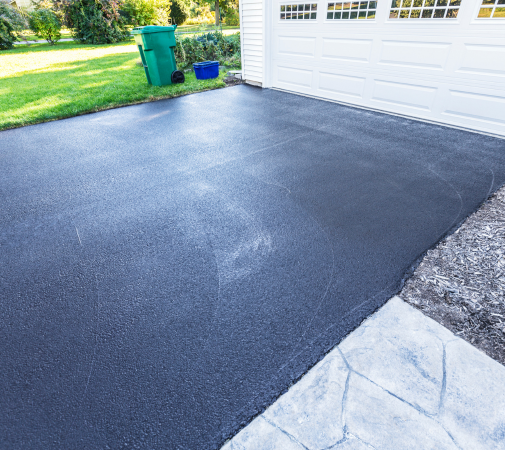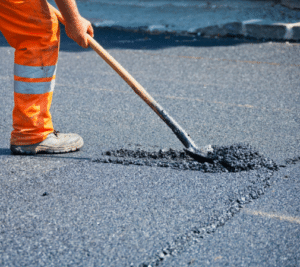Introduction
Proper grading for asphalt driveways is of utmost importance when it comes to maintaining the longevity and performance of your driveway. Grading refers to the process of creating a slope or elevation for your driveway, ensuring proper water drainage and preventing future issues such as water pooling or erosion.
Having a well-graded driveway not only enhances its aesthetic appeal but also prevents potential damage caused by water infiltration. Without proper grading, water can accumulate on the surface, leading to the development of potholes, cracks, and uneven pavement. These issues not only compromise the functionality of your driveway but also result in costly repairs and a shorter lifespan for your asphalt.
Moreover, proper grading also helps to divert water away from your home’s foundation, preventing potential water damage and structural issues. By establishing a slope that directs water towards the appropriate drainage areas, you can protect your driveway and your property.

Understanding Driveway Grading
Grading, in the context of driveways, refers to the process of leveling or sloping the surface to achieve proper water drainage and ensure a stable foundation. It is a crucial aspect of driveway maintenance that homeowners should understand.
The main purpose of grading is to facilitate water runoff, preventing it from pooling on the driveway’s surface and causing damage. When water accumulates and can’t flow away, it can seep into the asphalt, leading to cracks, potholes, and other structural issues. By grading the driveway, water can be directed towards the appropriate drainage areas, minimizing the risk of costly damages and preserving the driveway’s lifespan.
To have a better understanding of driveway grading, homeowners should be familiar with some common terms and concepts. One such term is “pitch,” which refers to the slope or angle of the driveway. The pitch should be adequate to allow water to flow smoothly without causing erosion or standing water.
Another important concept is “crown,” which involves creating a slightly raised center in the driveway. This helps divert water towards the edges, preventing water from pooling in the middle.
Understanding these grading terms and concepts enables homeowners to communicate effectively with professionals during driveway installation or maintenance projects. By grasping the significance of grading, homeowners can ensure their driveway remains in good condition, with proper water drainage and a structurally sound foundation.
The Importance of Proper Grading
Proper grading is crucial for the longevity and structural integrity of asphalt driveways. Failing to grade a driveway correctly can result in various issues, including water damage and foundation problems.
Improper grading can cause water to accumulate on the surface of the driveway, leading to puddles, erosion, and deterioration of the asphalt. Over time, this can weaken the driveway’s foundation and compromise its stability. Water infiltration can also seep into the underlying soil, causing moisture-related issues such as soil erosion, shifting, or settling, further damaging the driveway.
The lifespan of an asphalt driveway greatly depends on its grading. Poorly graded driveways are more susceptible to deterioration, cracking, and pothole formation. Without proper drainage, standing water can freeze during colder months, causing additional damage and accelerating the need for repairs or replacements.
Real-life examples of grading gone wrong serve as cautionary tales for homeowners. From driveways sloping towards the house, allowing water to infiltrate basements, to inadequate drainage causing widespread damage, these cases highlight the importance of proper grading.
In conclusion, homeowners must understand the significance of proper grading for asphalt driveways. By ensuring effective water drainage and preventing water damage and foundation issues, they can maintain a well-maintained and long-lasting driveway.
Planning Your Driveway Grading Project
Assessing the current grading of your driveway is an essential first step before undertaking any grading project. To start, take a walk around your driveway and carefully observe its surface. Look for any noticeable dips, puddles, or areas where water seems to collect. These are signs of poor drainage and improper grading, which need to be addressed.
To assess the slope of your driveway, use a measuring tape or a level to determine the height difference between the entrance and exit points. Ideally, your driveway should have a slight slope of at least 1/4 inch per foot, allowing water to flow away efficiently.
If you notice significant grading issues, it’s important to call a professional. Projects that involve extensive grading, leveling, or major repairs are best left to experienced contractors. They have the necessary expertise and equipment to handle more complex situations, ensuring a proper and durable solution.
Before starting any project, consider the legal and regulatory aspects. Some areas require permits for grading work, and it’s essential to comply with local codes and regulations. Check with your homeowner association as well, as they might have specific guidelines or restrictions regarding driveway grading.
In conclusion, proper planning is crucial when taking on a driveway grading project. Assess the current grading, seek professional assistance when needed, and ensure compliance with legal and regulatory requirements. By following these steps, homeowners can maintain a well-maintained and structurally sound driveway for years to come.
Professional Grading Solutions
To maintain the longevity and integrity of your asphalt driveway, professional grading is essential. Here’s why and when you should consider hiring a professional for your driveway grading needs:
1. Importance of Professional Grading: Professional grading plays a crucial role in preventing water damage, ensuring proper drainage, and avoiding costly repairs. It helps in creating a smooth and level surface, eliminating puddles and potholes.
2. Ideal Times to Hire Professionals: It is recommended to hire professionals for grading your asphalt driveway during the construction phase or when extensive repairs are required. Additionally, periodic grading is necessary to maintain the desired slope and prevent deterioration due to natural factors over time.
3. Selecting the Right Contractor: When choosing a driveway grading contractor, it is essential to consider the following factors:
a. Experience and Expertise: Look for contractors with a proven track record of successfully completing similar projects. Their experience ensures they understand the nuances of grading and can handle any complications that may arise.
b. Proper Licensing and Insurance: Ensure that the contractor is licensed and insured. This protects you from any liability in case of accidents or damage during the grading process.
By diligently considering these factors and asking the right questions, you can choose a professional grading contractor who will ensure your asphalt driveway is properly maintained and structurally sound for years to come.
Common Mistakes to Avoid
1. Over-grading and under-grading: Finding the right balance
One common mistake homeowners make when grading their asphalt driveways is either over-grading or under-grading the surface. Over-grading refers to excessively sloping the driveway, causing water to pool and not flow properly. On the other hand, under-grading results in inadequate slope, leading to poor water drainage and potential damage to the asphalt. Finding the right balance between these extremes is crucial to ensure efficient water runoff and prevent structural issues.
2. Ignoring the natural landscape and water flow patterns
Another common mistake is ignoring the natural landscape and water flow patterns around the driveway area. Failing to consider how water naturally moves can result in improper grading and water accumulation on the pavement. By understanding the topography and directing water away from the driveway through proper grading, you can prevent water damage and prolong the lifespan of your asphalt.
3. Failing to maintain the grade: The importance of periodic checks
Maintaining the grade of your asphalt driveway is essential for its longevity and performance. Many homeowners neglect to regularly check the slope and condition of their driveway, leading to unnoticed erosion or settlement issues that can worsen over time. By conducting periodic checks and addressing any grading issues promptly, you can prevent costly repairs and ensure that your driveway remains structurally sound.
In conclusion, avoiding common grading mistakes such as over-grading, under-grading, and neglecting maintenance checks is crucial for the proper maintenance of asphalt driveways. By finding the right balance, considering natural water flow patterns, and conducting regular inspections, homeowners can ensure their driveways are well-managed and durable.
Conclusion
In conclusion, understanding the importance of proper grading for asphalt driveways is crucial for homeowners. By recapping the key points discussed in this blog post, we have highlighted how maintaining the right slope and drainage can significantly impact the longevity and condition of your driveway.
Remember, investing in proper driveway grading not only ensures the safety of your property but also increases its value. Neglecting this aspect can result in serious damage, erosion, and expensive repairs down the line.
To ensure your driveway grading is up to par, take the time to assess its slope and drainage. If you notice any issues or are unsure about its condition, don’t hesitate to seek professional advice. Professional expertise can help identify potential problems and offer appropriate solutions tailored to your specific needs.
Don’t compromise on the health and longevity of your asphalt driveway. Take driveway grading seriously, and let’s create a solid foundation for your property together.



